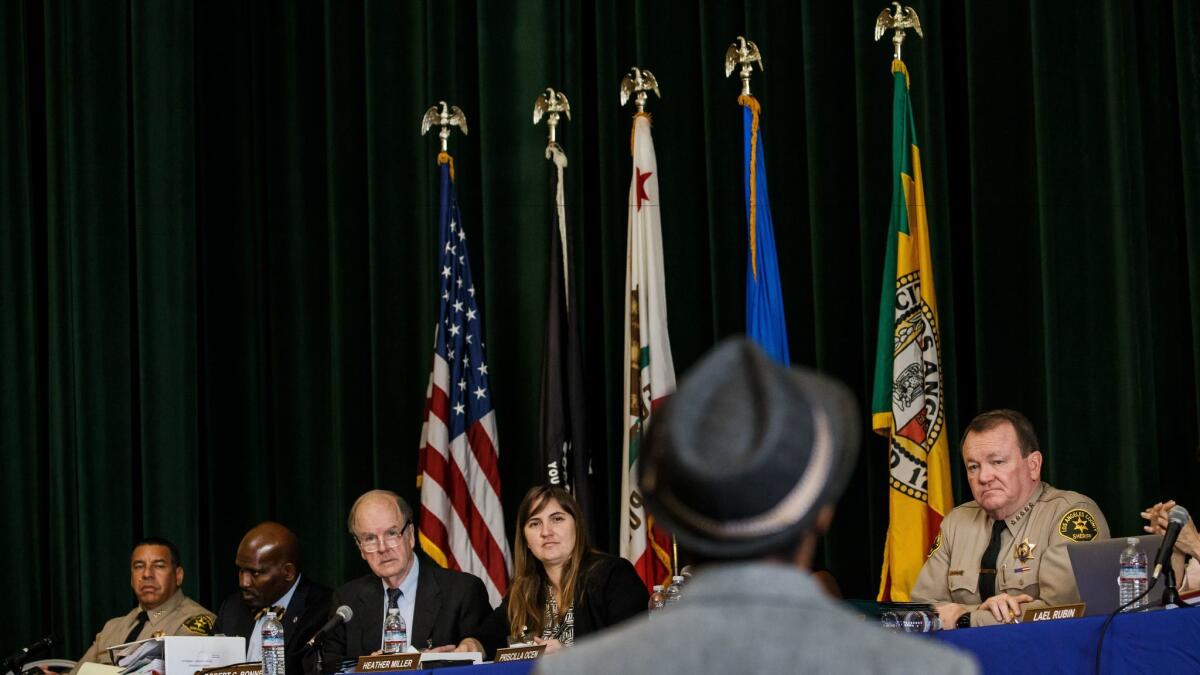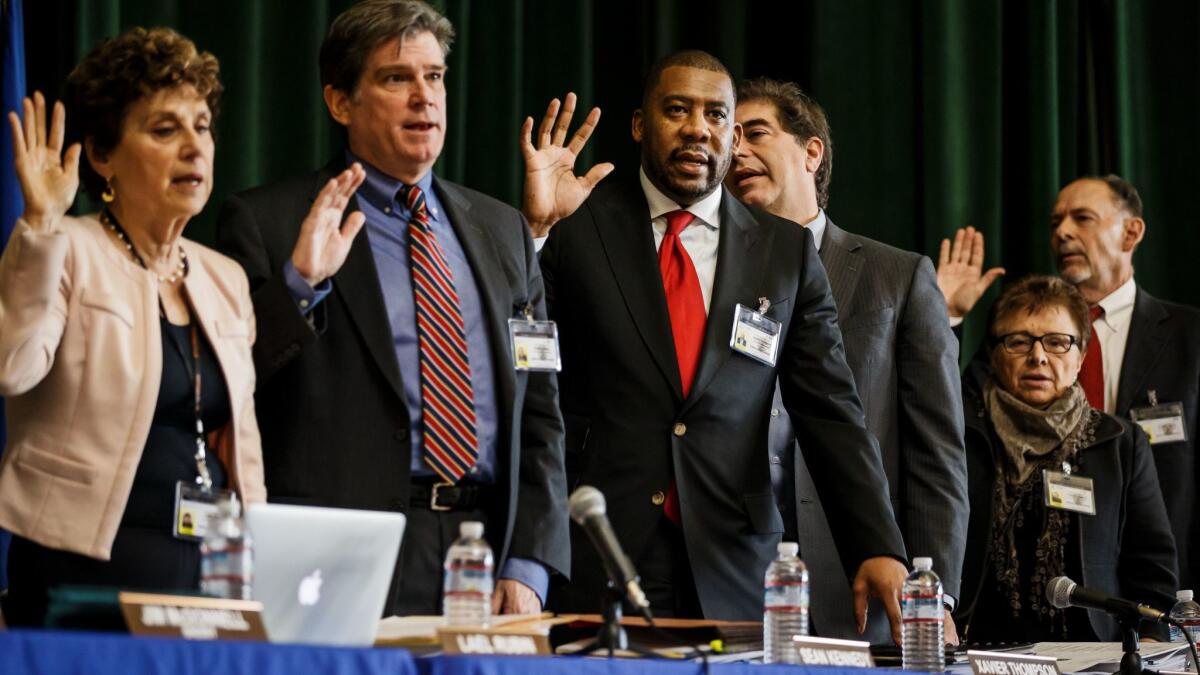After scandals, a group of civilians ushers in a new era of oversight for the L.A. County Sheriff’s Department

- Share via
Alicia Michel pleaded in front of the audience, asking for an inquiry into a sheriff’s deputy she said was corrupt.
The Compton resident said she didn’t feel comfortable lodging a grievance at her local Los Angeles County sheriff’s station, so instead she spoke into a microphone at a public forum Thursday, hoping her complaint would be heard by those all the way at the top of the department.
For the record:
11:16 a.m. Feb. 23, 2025Sheriff’s Department: An article about the L.A. County Sheriff’s Department Civilian Oversight Commission in the Jan. 27 California section said both the commission and inspector general could view internal disciplinary files. Only the inspector general can view the files, but he can report to the panel on general information from the files or on his assessment of the fairness of the probes.
“I wish to send it to the County of Los Angeles,” Michel said in Spanish, speaking through an interpreter. “That is why I’m here. I want an in-depth investigation.”
Michel’s brief statement immediately elicited an invitation to file a complaint directly with the county’s inspector general, Max Huntsman, who monitors the Sheriff’s Department and who was sitting just yards away.
Michel was one of dozens of members of the public who spoke up Thursday at the first meeting of the Sheriff Civilian Oversight Commission, a nine-person group appointed by the L.A. County Board of Supervisors to examine the Sheriff’s Department and provide recommendations on improving it.
A long-awaited body — composed of a law professor, two attorneys, an advocacy group director, a former prosecutor, a former public defender, a retired sheriff’s lieutenant, a pastor and a rabbi — the commission is the first all-civilian review board assigned to monitor the agency, one of the largest local law enforcement agencies in the nation.
Unlike the inspector general, whose office was established in 2014, the commission will hold monthly public meetings where anyone can comment and is set up to address overarching themes rather than detailed policy analyses. The commission and inspector general will work together and can view internal disciplinary files on deputies through a cooperative agreement Huntsman has with the department.
Neither oversight group has subpoena or disciplinary power, an element some critics have said is necessary to straighten out a department battered by a years-long jail abuse scandal.
The meeting came a day after President Trump issued two executive orders signaling a crackdown on people living in the U.S. illegally, a topic raised by many audience members who said they’re terrified by the possibility of immigration officials working more closely with the department.
“Within my family, there’s fear for our family members who have been deported, and we’re worried that they won’t be able to come back,” said Vanessa Deleon, a member of the Youth Justice Coalition.
Sheriff Jim McDonnell pledged this week to not let Trump’s orders alter his department’s practice of staying out of immigration enforcement, noting it’s a federal responsibility. Immigration officials have some access inside the county jail system, which the department runs.
McDonnell, who’s advocated for a civilian oversight group and was a member of the Citizens Commission on Jail Violence, a blue-ribbon panel that chronicled a pattern of abuse in the county jail system in 2012, said the new commission represents an opportunity for his department to be “the national model of transparency.”
“I ask that you share community concerns with us freely. When we are wrong, we will own it, acknowledge it and fix it. But when we perform our duties in a manner that demonstrates the courage, compassion and commitment that the overwhelming majority of our people have every day, [we ask] that you acknowledge that as well,” said McDonnell, who attended about an hour of the meeting.

Concerns over immigration and the use of drones, which the department unveiled this month, calling them “unmanned aerial devices,” dominated the session. The department said deputies would limit use of the aircraft to serious incidents, such as search-and-rescue operations or standoffs with armed, barricaded suspects, but critics worried the devices could eventually be used in everyday surveillance.
“We’re wondering, why this high level of military-grade weapons?” said Steve Rogers, a member of the advocacy group Dignity and Power Now. “It’s almost like the Sheriff’s Department is preparing to go to war against the community.”
The meeting began at 9:30 a.m. at Bob Hope Patriotic Hall, a building just south of downtown owned by the county Department of Military and Veterans Affairs. Some attendees said the time and location of future meetings should be changed so that more residents who work during the day could participate. The panel is scheduled to meet on the fourth Thursday of each month.
Others argued that the presence of metal detectors and deputies standing at the front of the auditorium, as well as at some of the exits, could make some people uncomfortable about critiquing the department at the meetings.
“We hear you,” Commissioner Xavier Thompson, president of the Baptist Ministers’ Conference and a senior pastor at Southern St. Paul Church, told the audience at one point. “We are not asleep at the wheel. Hold us accountable as we hold the Sheriff’s Department accountable.”
Twitter: @mayalau
ALSO
Video shows California prisoners offering protection and escape help to drug lord ‘El Chapo’
Missing Porsche belonging to slain renowned hairdresser is recovered
Man shot by El Cajon police had cocaine in his system, autopsy finds
More to Read
Sign up for Essential California
The most important California stories and recommendations in your inbox every morning.
You may occasionally receive promotional content from the Los Angeles Times.











